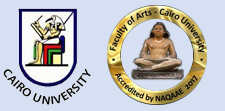عنوان المقال عربي
الخطاب الشعرى فى السبعينيات رفعت سلام نموذجا
Document Type
Book Review
Abstract English
The term (discourse) is one of the most frequently used terms among contemporary Arab critics as a result of their contact with global monetary currents, and their desire to transcend traditional concepts. All cultural and critical theories have a severe interpretive difficulty in determining the concept of discourse” (), and the difficulty in defining this term is due to several things, including: A- The first is represented by the most frequent and diverse cultural practices, which work to transfer the term from one culture to another without any regard for its characteristics that it acquired from the original cultural environment in which it originated and was formed, and without also taking into account the characteristics of the culture in which it is intended to be used. B- The second matter is related to a group of different theoretical challenges in the fields in which it was used, and these differences are due to the theoretical starting points of these perceptions and their epistemological backgrounds. Sarah Mills: The Concept of Discourse in Contemporary Literary and Linguistic Studies, translated by Issam Kamel Khalaf, Cairo. Dar Farha for publication and distribution. 2003 AD, p. 37, and see in the same meaning: Nouria Saleh Fawzi, “Theatrical Discourse in Literary Criticism,” Fosoul Magazine 1997 AD, Vol. 16, P. 3, p. 189.
الملخص العربي
يعد مصطلح (الخطاب) من أكثر المصطلحات تداولا لدى النقاد العرب المعاصرين نتيجة احتكاكِهم بالتيارات النقدية العالمية، ورغبةً منهم في تجاوزِ المفاهيم التقليدية، فإذا ما انتقلنا إلى تعريف مصطلح (الخطاب) وجدنا صعوبة في تعريفه، وهذا ما تقررُه سارة ميلز حين تقول: "ففي كلِّ النظريات الثقافية والنقدية توجدُ صعوبةً تفسيريةً حادةً في تقريرِ مفهوم الخطاب"([1])، وترجع صعوبة تعريف هذا المصطلح إلى أمور عدة منها: أ- يتمثل الأمر الأول في الممارسات الثقافية الأكثر تواترًا وتنوعًا، والتي تعملُ على نقل المصطلح من ثقافةٍ إلى أخرى دون أيةِ مراعاة لخصائصِه التي اكتسبها من البيئة الثقافية الأصلية التي نشأَ وتشكَّل فيها، ودون مراعاة أيضًا لخصائص الثقافة التي يُصار إلى استخدامه فيها. ب- الأمر الثاني يتعلق بمجموعة التحديات النظرية المختلفة في المجالات التي اُستعمل فيها، وترجعُ هذه الاختلافات إلى المنطلقات النظرية لهذه التصورات وخلفياتها الابستمولوجية. سارة ميلز: مفهوم الخطاب في الدراسات الأدبية واللغوية العاصرة، ترجمة عصام كامل خلف، القاهرة. دار فرحة للنشر والتوزيع. 2003م، ص37، وانظر في المعنى ذاته: نورية صالح فوزي، "الخطاب المسرحي في النقد الأدبي"، مجلة فصول1997م ، مج16،ع 3، صـ189.
Recommended Citation
Maarouf, Mahmoud Maarouf Abdel Nazir
(2019)
"The poetic discourse in the seventies, Rifaat Salam as an example,"
Journal of the Faculty of Arts (JFA): Vol. 79:
Iss.
2, Article 12.
DOI: 10.21608/jarts.2019.81653
Available at:
https://jfa.cu.edu.eg/journal/vol79/iss2/12
Digital Object Identifier (DOI)
10.21608/jarts.2019.81653
Accept Date
2018-04-11
Publication Date
4-1-2019

